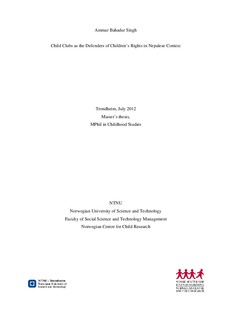| dc.contributor.advisor | Haugen, Gry Mette Dalseng | nb_NO |
| dc.contributor.author | Singh, Ammar Bahadur | nb_NO |
| dc.date.accessioned | 2014-12-19T14:37:29Z | |
| dc.date.available | 2014-12-19T14:37:29Z | |
| dc.date.created | 2012-10-15 | nb_NO |
| dc.date.issued | 2012 | nb_NO |
| dc.identifier | 560751 | nb_NO |
| dc.identifier.uri | http://hdl.handle.net/11250/269057 | |
| dc.description.abstract | Children are seen as competent social actors in new social studies of childhood and proponents of which seek for children’s participation in all matters that are of interest to children, and simultaneously and thereafter influence the decision making process that affect them in both explicit and implicit terms. Additionally, the UNCRC in articles 12 and 13 legally provisions for the participation of children to have a say on the issues of their concerns and their views should be taken into consideration. The community based child clubs seem to have emerged to meet this end.
My thesis aimed at exploring the lived experiences of children involved in the community based child clubs in order to gain knowledge on how the clubs have been good defenders of children’s rights, particularly their right to participate and agency and what implications the clubs have in Nepalese society.
Qualitative questionnaires as a gateway to enter the issue, and (semi) interviews, focus groups discussions and ranking as primary qualitative methods were used to collect data. Nine children, five girls and four boys, and six adults were the informants, but children were the focus of the research. The empirical data were further analyzed and interpreted.
This research shows that the community based child clubs have been a good forum for children to get information on children’s rights and other issues, and develop their personal and social skills. Children’s participation in the social activities that are of direct interest to children has been the main focus of the clubs. Children lead, manage and implement the clubs activities and program themselves and hence children’s agency has been recognized and promoted. These clubs have brought positive changes to children themselves, their families and societies. Furthermore, the clubs have got a strong space in the society and challenged the traditional beliefs and practices that discourage child participation. Thus, it is reasonable to say that the child clubs have turned into a real crusader for informing, promoting and protecting children’s right to participate and hence develop their agency. | nb_NO |
| dc.language | eng | nb_NO |
| dc.publisher | Norges teknisk-naturvitenskapelige universitet, Fakultet for samfunnsvitenskap og teknologiledelse, Norsk senter for barneforskning | nb_NO |
| dc.subject | Social and Behavioural Science, Law | en_GB |
| dc.title | Child Clubs as the Defenders of Children's Rights in Nepalese Context | nb_NO |
| dc.type | Master thesis | nb_NO |
| dc.contributor.department | Norges teknisk-naturvitenskapelige universitet, Fakultet for samfunnsvitenskap og teknologiledelse, Norsk senter for barneforskning | nb_NO |
